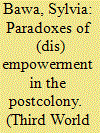| Srl | Item |
| 1 |
ID:
168243


|
|
|
|
|
| Summary/Abstract |
This article examines contextually-grounded perspectives on the socio-political significance of marriage in contemporary Ghanaian society. Drawing on qualitative interviews among men and women in northwestern Ghana, this article argues that, beyond historicizing the institution of monogamous marriage, women’s agency in desiring, and navigating marriages are performatively agentic and tied to attaining a myriad of socio-cultural, economic and political capital. Situated within the constrained articulations of participants, our findings alert us to complex negotiations and manoeuvres through which men and women aspire for specific forms of masculinities and femininities within the larger gender hierarchies.
|
|
|
|
|
|
|
|
|
|
|
|
|
|
|
|
| 2 |
ID:
143569


|
|
|
|
|
| Summary/Abstract |
Women’s empowerment discourses in Africa involve contradictory desires from women on one hand and society at large on the other. This article argues that the traditional validation mechanisms for women’s identities are crucial avenues for analysing both the conceptions and experiences of empowerment. Drawing on primary ethnographic data, I analyse paradoxes in women’s empowerment discourses in postcolonial Ghanaian societies, where neoliberal discourses thrive side-by-side with collectivist–socialist cultural ideals. Using an example of social capital, gained largely through mothering, I suggest that, because women’s relationships with capital are structured by local socio-cultural and global economic structures and relations, the theorisation and application of the concept of empowerment need to recognise the complicated relationships (with capital) that women negotiate on a daily basis.
|
|
|
|
|
|
|
|
|
|
|
|
|
|
|
|
| 3 |
ID:
135039


|
|
|
|
|
| Summary/Abstract |
Because of the absence of evidence to show for its utility, the notion of ‘development’ has been fraught with many debates over the years. This paper is concerned with re-examining the future of development studies, based on its past and present trajectories. The argument here is that development may be useful if its norms and practices become context-specific and are made to benefit its purported beneficiaries. The chronology spans the period after World War II to the present day, and thus covers theories that envision alternatives. While this chronology is overlapping, we hope to show that development studies has been marked by both continuities and discontinuities.
|
|
|
|
|
|
|
|
|
|
|
|
|
|
|
|